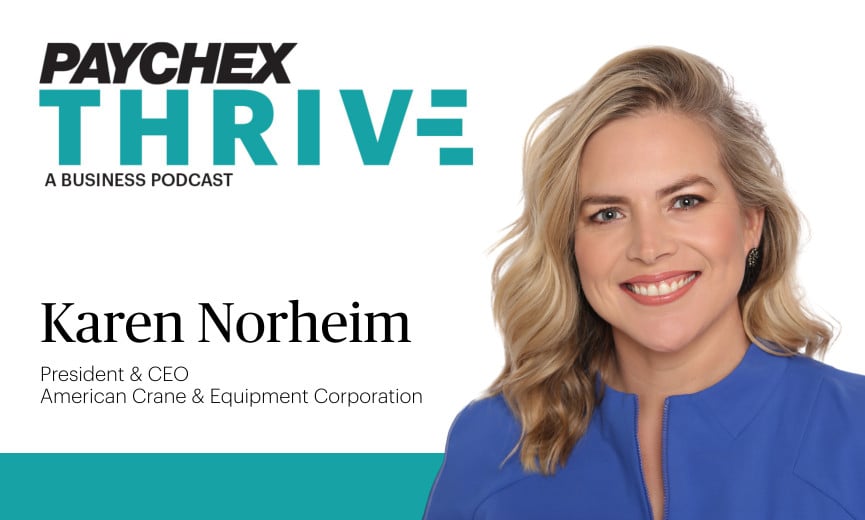Small Business Concerns: Economic Stability, Cybersecurity, Inflation, and Succession Planning

Podcast •

Vea
Resumen
In this episode of Paychex THRIVE Week in Review, host Gene Marks delves into recent surveys highlighting the challenges faced by small businesses. Key insights include the latest findings from MetLife and the US Chamber showing stable economic views but heightened inflation and revenue concerns, a Viking Cloud report revealing significant underreporting of cyber attacks due to job security fears, and Census Bureau data underscoring a looming crisis in business succession planning as a significant portion of business owners near retirement. Marks emphasizes the importance of transparency in cybersecurity and the need for proactive succession strategies.
Ver transcripción
Gene Marks:
Hey everybody, it's Gene Marks. And welcome to this week's episode of the Paychex THRIVE Week in Review. This is where we take a few items from the news and we talk about them a little bit because they impact your small business and mine. So let's get to the news, shall we? The first item of news today comes from MetLife and the US Chamber. Last week,
this past week they released a new survey, their Small Business Index, which is down from last quarter's score but matched this time last year. While most index measures are not down significantly this past quarter, there is a slight softening across measures of business health, cash flow and increases in staff. Now, this survey was taken between January 28 and February 14 and the views of the US and local economies are very stable this quarter. Around 3 in 10 small businesses believes that the US economy is in good health. 37% say the same of their local economy.
Both of these measures are on par with last quarter and the first quarter of 2024. The survey also found that inflation continues to be small business owners top concern by far and this concern is at record highs. Although concerns about revenue also jumped this month, consistent for the past three years, inflation continues to be the biggest challenge. 35% of small businesses site revenue is a challenge, up 10 points from last quarter.
It's at its highest point since tracking began on this issue in 2021. The increasing concern about revenue is especially pronounced among small businesses in the Midwest, south and Western regions. So, according to MetLife and the US Chamber of Commerce, as of February 14, most small business owners are still seeing a very stable economy, they're still concerned about inflation and revenue growth, but other level of uncertainty is not spiking, at least any time yet. The next bit of news is an interesting survey that I found reported on businesswire.com from a company called Viking Cloud, a research firm.
They found, are you ready for this? 40% of cyber teams have not reported cyber attacks because they are afraid of losing their jobs. So let me repeat some of this data. 40% of cyber teams have not reported cyber incidents out of fear of losing their jobs, a disclosure according to the report that signifies a serious underreporting of cyber breaches globally. This trend also leaves businesses at risk of being non-compliant with emergency emerging industry regulations as well as vulnerable to rising attacks, reported the survey to have both increased in frequency.
49% of companies said that they were of increase of an attack. 43% also said that they saw increasing attacks over the past 12 months. The data came from a survey of about 170 cybersecurity professionals in the United States, United kingdom and Ireland. 96% of companies are confident in their ability to detect and respond to cyber attacks in real time. Yet the same companies also acknowledge that they are unprepared for today's most pressing cyber risks, including ransomware attacks against, based on a critical third party phishing attacks, DNS attacks, and of course, ransomware attacks against their businesses.
But what's most revealing about the survey to me is how many, I mean, again, let's go, let's repeat this. 40% of the cyber teams not even reporting these cyber attacks. So again, that's not only just a, you know, an issue of whether we're underreporting the level of cyber breaches, but a serious concern as to why they're not reporting this. They say they're afraid of losing their jobs. Definitely a cultural issue that if you're running a business and you've got your IT team, I think you got to make it very, very clear to them that if they're, if we are subject to or victim of a cyber attack, it's not anyone's fault.
It has to be disclosed. It's better that we're honest and transparent about this so we can fix it and also make sure we've got controls in place to make sure that these things don't happen again. But I thought that was very, very revealing. Finally, another survey that was just this came out from the, from the Census Bureau actually has to do with succession plans of small business owners. Most of us do not have a succession plan.
Again, this comes from the Census Bureau reported data just this past week. 52.3% of of us employing businesses are owned by people who are at or near retirement age 50. That's 55 or older. These firms represent 3 million of the nearly 6 million private sector employer jobs. Right, but this is all according to previous Gallup polls.
But listen to this. New Gallup research shows that as employer business owners think about retirement, 74% have plans to sell or transfer the ownership of their business. These transactions have the potential to enhance the wealth of their family members. Only 35% of these owners plan to transfer ownership through a sale or gift. 27% plan to close the business.
And 40%. 40% say they are uncertain of their plans. That's four out of ten business owners are uncertain about their succession planning. So let's all be clear. Again, let's also make sure that we're all, we know these numbers.
More than half almost 53% of business owners businesses are owned by people over the age of 55. I saw another survey from the Small Business Administration that said that the average age of the US small business owner is over the age of 55. We have a succession planning issue coming up. Almost a crisis. 40% of these people do not have succession plans in place.
How they're going to pass down their businesses to their family or maybe sell their businesses or or do something with their employees. That's an issue that definitely needs to be resolved. You have been watching and listening to this week's episode of the Paychecks Thrive Week in Review and my name is Gene Marks. Thank you so much for watching and listening. If you need any help or tips or advice in running your business, please Visit us at paychecks.com forward/thrive.
Download or sign up for our newsletter. You'll get all the help you need to run stuff. Thanks for watching. Thanks for listening. We'll see you again next week.
Take care. Do you have a topic or a guest that you would like to hear on THRIVE? Please let us know. Visit payx.me/thrivetopics and send us your ideas or matters of interest. Also, if your business is looking to simplify your HR, payroll, benefits or insurance services, see how Paychex can help.
Visit the resource hub paychex.com/worx. That's W O R X. Paychex can help manage those complexities while you focus on all the ways you want your business to thrive. I'm your host Gene Marks, and thanks for joining us. This podcast is Property of Paychex Incorporated 2025.
All rights reserved.

 Apple Podcast
Apple Podcast Spotify
Spotify iHeartRadio
iHeartRadio









